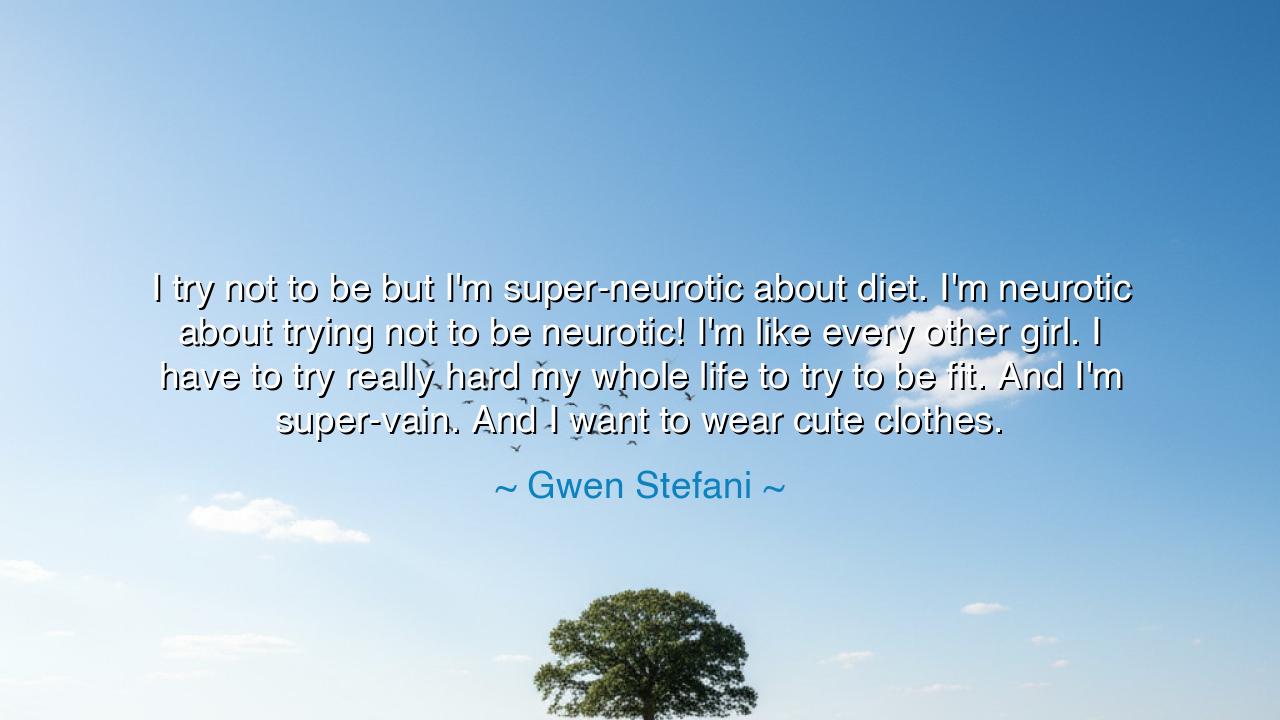
I try not to be but I'm super-neurotic about diet. I'm neurotic
I try not to be but I'm super-neurotic about diet. I'm neurotic about trying not to be neurotic! I'm like every other girl. I have to try really hard my whole life to try to be fit. And I'm super-vain. And I want to wear cute clothes.






In the strikingly honest words of Gwen Stefani, there lies a reflection of the eternal human struggle between self-acceptance and self-discipline: “I try not to be but I'm super-neurotic about diet. I'm neurotic about trying not to be neurotic! I'm like every other girl. I have to try really hard my whole life to try to be fit. And I'm super-vain. And I want to wear cute clothes.” Though spoken in the language of modern life, her confession carries the rhythm of timeless truth—the struggle to balance the demands of the body with the longings of the spirit, the natural desire for beauty with the deeper quest for peace. Her words are not of vanity alone, but of vulnerability; they reveal a heart that labors under the weight of perfection while yearning for freedom.
To be neurotic about diet is not merely to care about food or fitness—it is to live in the tension between discipline and self-criticism. Stefani admits to an awareness of this conflict; she sees her own obsession, and yet she is caught within it. This, too, is profoundly human. The ancients knew this struggle as the war between body and mind, between the desire for beauty and the pursuit of inner harmony. Socrates taught that moderation was the path to virtue, warning that obsession—whether for food, wealth, or appearance—binds the soul in invisible chains. Yet he also understood the heart’s yearning for self-expression, for the beauty that reflects the divine. Stefani’s words echo that same ancient paradox: the need to strive and the need to rest, to care and yet to let go.
When she says, “I’m neurotic about trying not to be neurotic,” she reveals a truth that philosophers and monks alike have wrestled with for millennia—that even the pursuit of peace can become a form of unrest. The mind that seeks control often breeds chaos; the will that strives for calm can stir the very storm it wishes to quiet. So it was with Epictetus, the Stoic philosopher who once taught that freedom lies not in controlling all things, but in mastering the self’s reaction to them. In Stefani’s confession, we hear that same yearning—to find balance within the contradictions of being human. She wants to be disciplined, yet at ease; self-aware, yet unburdened; beautiful, yet free from vanity. It is the eternal dance between effort and surrender.
Her statement, “I have to try really hard my whole life to be fit,” carries not only the weight of personal effort but the burden of societal expectation. From the temples of ancient Greece to the modern stages of fame, the human form has always been both admired and judged. In Sparta, the warrior’s strength was seen as divine, and in Athens, the sculpted body was a reflection of virtue and balance. Yet, the danger arises when beauty becomes tyranny—when the pursuit of perfection overshadows joy. Stefani’s honesty breaks through this illusion. She reminds us that behind every idealized image lies the labor of discipline, the exhaustion of maintenance, and the anxiety of comparison. Her confession is not weakness—it is courage, the courage to admit that even those who seem perfect wrestle with imperfection.
When she calls herself “super-vain,” it is not mere vanity, but the acknowledgment of her humanity—the awareness of her longing to be seen, admired, and beautiful. For in truth, vanity, when tempered by self-knowledge, becomes a mirror of the soul’s deeper desire: to be valued, to be loved. The ancients, too, understood this. In Narcissus, the youth who fell in love with his reflection, we see the tragedy of unchecked self-adoration—but in the Venus de Milo, we see beauty celebrated not as vanity but as an offering to life itself. Stefani’s vanity is not the curse of Narcissus, but the confession of one who wants to belong to beauty without being consumed by it.
Her final words—“And I want to wear cute clothes”—bring this grand inner battle down to earth, reminding us that behind all philosophy and struggle lies something simple: the desire to feel good in one’s own skin. There is tenderness in her honesty, a recognition that even the profoundest hearts seek joy in small things. The wise have always said that the divine hides in the ordinary—that truth lives as much in the longing for a beautiful garment as in the search for enlightenment. For what is the pursuit of beauty, if not an expression of gratitude for the life we’ve been given?
Thus, from Stefani’s confession, we may draw a lesson both practical and eternal: strive, but gently. Care for your body, but do not worship it. Seek beauty, but not at the cost of peace. The wise man and the artist share the same truth—that balance, not perfection, is the highest form of grace. When your heart grows anxious about your diet, your fitness, or your reflection, remember this: the body is your vessel, not your master. Feed it with love, move it with joy, adorn it with gratitude. For in doing so, you honor not only yourself, but the divine spark that made you.
And so, let Gwen Stefani’s words ring as both confession and counsel to those who come after: the struggle for balance is lifelong, but it is sacred. The path between discipline and delight, between vanity and self-love, is narrow but radiant. Walk it with awareness, walk it with kindness, and when you falter—as all must—smile, forgive yourself, and continue onward. For the soul that strives in awareness, even amid its flaws, is already beautiful beyond measure.






AAdministratorAdministrator
Welcome, honored guests. Please leave a comment, we will respond soon